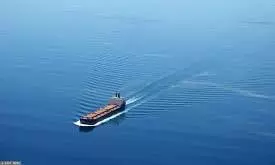
Damaged ship carrying dangerous cargo stranded in the North Sea for weeks
text_fieldsA damaged Maltese-flagged ship, the Ruby, has been stranded in the North Sea for weeks, laden with a highly volatile cargo of 20,000 tonnes of ammonium nitrate.
Despite its seaworthiness, European ports have turned the vessel away, fearing the risks associated with its hazardous load, often used in fertilizers and explosives.
The Ruby, a Handymax bulk carrier, began its journey from the Russian port of Kandalaksha on August 22, but ran into trouble during a storm in the Barents Sea. After being inspected for damage in Tromsø, Norway, it was ordered to seek repairs elsewhere. However, ports in Lithuania and other European locations refused entry, insisting that the explosive cargo be offloaded first.
Since September 25, the ship has been anchored near the busy Dover Strait in the UK, while authorities scramble to find a solution.
The cargo of ammonium nitrate aboard the Ruby is more than seven times the amount that caused the devastating explosion in Beirut in 2020. While the material is not directly explosive, it serves as a combustion agent, making it a potential fire hazard. Experts have emphasized the difference between the Ruby’s cargo and the material involved in the Beirut disaster, which was intended for explosives, but concerns remain high due to its dangerous nature.
Attempts to find a suitable port willing to accept the Ruby's hazardous load have been complicated, with few options available. British coastguards have confirmed the ship is safe and seaworthy, but unloading the cargo is a complex and expensive process that could cost hundreds of thousands of euros.
The situation draws comparisons to previous maritime incidents, such as the 1999 Erika oil spill off the coast of France, which prompted the European Union to enforce stricter maritime safety regulations. These regulations require EU states to offer places of refuge for ships in distress, though the rules are open to interpretation, leading to prolonged delays in some cases.






















